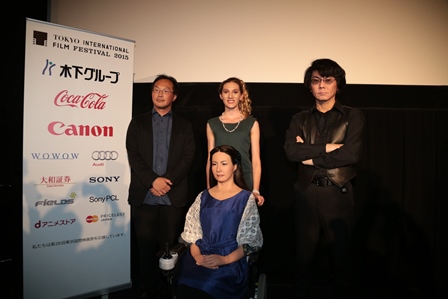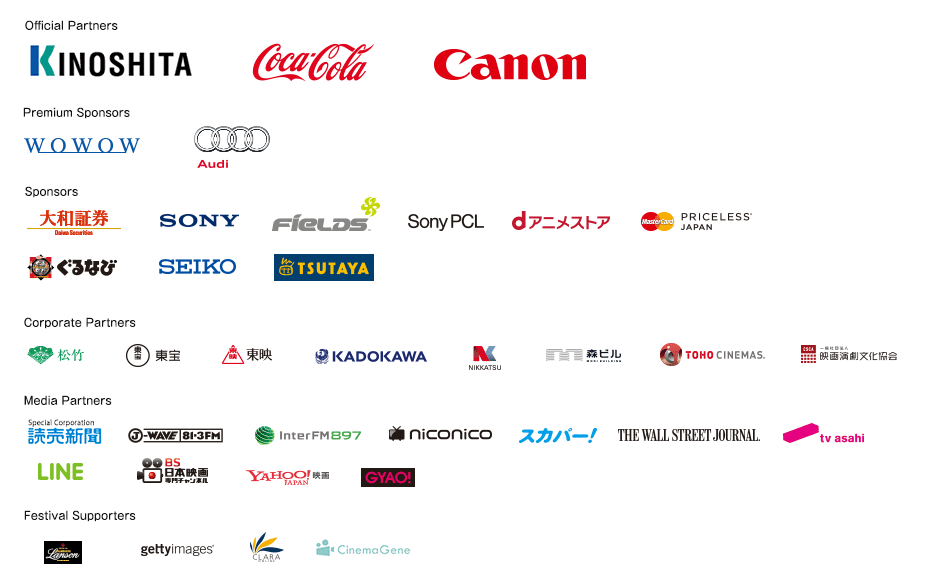ART FUSES WITH SCIENCE IN POETIC VISION OF A DYING JAPAN

The Japan of Sayonara is both beautiful and terrifying, bleak and yet hopeful. Opening with news reports about multiple nuclear reactors exploding across the country, its dystopian vision is counterbalanced by stunning long-shots of breathtaking scenery in Suwa, Nagano Prefecture, where the Competition film was shot.
As the press notes describe it, Sayonara is about humans and technology, poetry and nuclear power, the distinction between robots and humans. But it is above all a story about death and dying. It also happens to be the world’s first film featuring an android “actress.” Based on the short 2010 play of the same name, arising from the collaboration of noted Japanese playwright Oriza Hirata with famed robotics engineer Hiroshi Ishiguro of Osaka University, it showcases two interdependent performances of subtle virtuosity.
When we first meet them, South African Tania (American actress Bryerly Long) and the android Leona (Geminoid F), are living in the countryside, awaiting evacuation — Japan is so contaminated that a nationwide lottery has been systematically moving all citizens overseas. As an immigrant, Tania must wait for the Japanese to be evacuated first. But the towns are gradually becoming depopulated, and her number doesn’t come up. She is already ill, perhaps from the radiation, perhaps from a disease that the radiation has exacerbated. Although she has a friend and a boyfriend who sometimes drop by, her loneliness and isolation are palpable.
At a press conference following the screening of Sayonara on October 24, director Koji Fukada explained why the play had captivated him, and how he came upon the idea to expand the storyline. “The nuclear explosions and the refugees don’t appear at all in the play,” he said. “But I saw it and instantly wanted to make it into a film, because the dying woman and the robot who doesn’t die were really intriguing to me. In order to portray the solitude of the dying woman, I thought I should set it against a world that’s also dying. And the nearest, most realistic possibility was the 40 nuclear plants we have in Japan. What would happen if they all exploded?”
Fukada, whose Au revoir l’été (2013) and Hospitalité (2010) were multiple award winners and screened in festivals around the world, hastened to add: “It’s not an anti-nuclear power film, but that’s the most realistic danger for Japan.”
Much of the Q&A discussion was devoted, understandably, to the technical aspects of the film. As his creation sat passively in Leona’s wheelchair, Ishiguro said, “We’ve been trying these androids out in a variety of settings, from department stores to training lectures, to the theater. We tried to learn from the play to make Leona more human, and this was a revolutionary experience. It was the android throughout the film, not any CG, which is the first time in history, an epoch-making event.”
Fukada explained that the film production required a variety of methods that hadn’t been necessary for the play: “We sometimes used pre-recording and synchronizing with the actors, but we had to program on the spot when we made changes on set. But one drawback is that we shot Geminoid F outside, and she’s a little sensitive to rain, so when it rained, it wasn’t easy.”
Long, a trilingual actress who made her film debut in Fukada’s Hospitalité and had performed the play in Europe, North America and Australia, as well as all over Japan, said, “In the US and Europe, people have been very uneasy about the human and android being so close. So I like to think about it as a new form of puppet theater, like a puppet being imbued with a soul. It’s like in acting: you have a naturalistic approach, with everything coming from inside, and you have a stylistic approach, where it’s all about the form. The robot is being nominated [at TIFF] for the Best Actress Award, and I’m hoping she might win because it really will make people think about what acting is.”
Both the director and the robot designer expressed excitement for the future of the film industry, envisioning androids stepping into roles more convincingly — and cheaply — than their human co-stars. “I sometimes think androids can express more than humans,” Ishiguro remarked. “For most androids, if you look at them for 2 seconds, it’s clear that they’re not human. Their movements are much simpler. But this leaves room for the human imagination, because we tend to interpret their emotions in positive ways.”
Fukada was asked about his focus on immigrants in the film. Tania’s boyfriend is a Korean living in Japan, yet his own family’s experience with discrimination leads him to judge her harshly when he learns that her family had suffered reverse discrimination following the end of apartheid.
“After 3/11, we had the triple tragedy of earthquake, nuclear meltdown and huge tsunami,” Fukada explained. “There was this ad-agency attitude toward the recovery, with keywords like kizuna (strengthening bonds) and Gambare Nippon! (Don’t Give Up, Japan!). I felt really strange when I heard these, because they tried to erase all the individual suffering. The victims weren’t just Japanese, they were foreigners, too, like immigrants and tourists.”
Although he didn’t quite say it, the director sees Leona as the ultimate foreigner, in an all-too-believable portrait of a nation that is abandoning its disenfranchised. After all, Leona is not only non-Japanese, she’s not even human. The film’s accomplishment is in making us almost forget that; making us feel that she feels — at least as much as Tania does — and in the final, transcendent scenes, perhaps even more.
[Karen Severns]






















